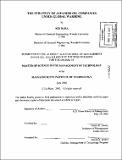| dc.contributor.advisor | Henry D. Jacoby. | en_US |
| dc.contributor.author | Hara, Kei, 1963- | en_US |
| dc.contributor.other | Massachusetts Institute of Technology. Management of Technology Program. | en_US |
| dc.date.accessioned | 2005-08-23T20:27:14Z | |
| dc.date.available | 2005-08-23T20:27:14Z | |
| dc.date.copyright | 2002 | en_US |
| dc.date.issued | 2002 | en_US |
| dc.identifier.uri | http://hdl.handle.net/1721.1/8473 | |
| dc.description | Thesis (S.M.M.O.T.)--Massachusetts Institute of Technology, Sloan School of Management, Management of Technology Program, 2002. | en_US |
| dc.description | Includes bibliographical references (leaf 65). | en_US |
| dc.description.abstract | Global warming is becoming a greater issue for human beings. People's life has become rich, comfortable and convenient, especially in developed countries. The rich life is supported by huge energy consumption and the energy consumption by human beings destroys natural balance of the earth. As consumption of oil is one of the highest contributors of greenhouse gases emissions, we need to reduce oil consumption- in order to cope with global warming. For oil companies, this is a tough business circumstance. Oil demand will diminish and oil companies will face severer competition and need to contribute energy conservation as well. This thesis analyses business circumstance of oil business in Japan and competences of ExxonMobil Japan and argues its future strategy. The analysis found that a competition in Japanese oil industry is a price competition and core competencies are all to compete price competition. The competition will be keener due to diminished oil demand. The argument suggests that the company should change its product from oil to service related to oil. Though the differentiation of oil product is difficult because of the quality regulations, services can be differentiated. As services can be improved by the feedback from customers. getting information on customer needs is another key issue. The thesis recommends that the company should collaborate with other industries and provide services beyond the current industry boundary. | en_US |
| dc.description.statementofresponsibility | by Kei Hara. | en_US |
| dc.format.extent | 65 leaves | en_US |
| dc.format.extent | 6269184 bytes | |
| dc.format.extent | 6268945 bytes | |
| dc.format.mimetype | application/pdf | |
| dc.format.mimetype | application/pdf | |
| dc.language.iso | eng | en_US |
| dc.publisher | Massachusetts Institute of Technology | en_US |
| dc.rights | M.I.T. theses are protected by copyright. They may be viewed from this source for any purpose, but reproduction or distribution in any format is prohibited without written permission. See provided URL for inquiries about permission. | en_US |
| dc.rights.uri | http://dspace.mit.edu/handle/1721.1/7582 | |
| dc.subject | Management of Technology Program. | en_US |
| dc.title | The strategy of Japanese oil companies under global warming | en_US |
| dc.type | Thesis | en_US |
| dc.description.degree | S.M.M.O.T. | en_US |
| dc.contributor.department | Management of Technology Program. | en_US |
| dc.contributor.department | Sloan School of Management | |
| dc.identifier.oclc | 50705227 | en_US |
